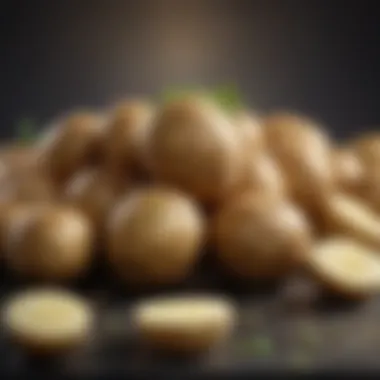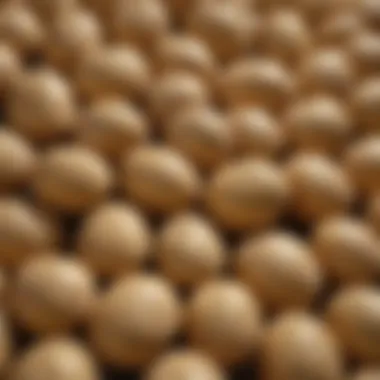Examining the Link Between Potatoes and Headaches


Intro
Understanding the intricate relationships between diet and health can be a complex undertaking. Among staple foods, potatoes often feature prominently on tables and why not? They are versatile, too.
However, emerging discussions have raised questions about their role in contributing to headache conditions for some individuals. With the delightful yet simple potato existing frequently, an inquiry into its connection to headaches warrants scrutiny.
Through this exploration, we aim to dissect the dietary implications and inquire into the nutritional intricacies of this common food. In doing so, we reveal vital insights.
One must transition to the Ingredients Breakdown, as comprehending any implications becomes easier when analyzing vital components.
Ingredients Breakdown
Primary Ingredients
Potatoes comprise a few varieties, each offering unique tastes and textures. Common varieties wll include Russet potatoes, Yukon Golds, and red potatoes. They all share one common trait: a high potassium level. The starch content in potatoes varies slightly among types, impacting their glycemic index, which plays a notable role in headaches.
Optional Ingredients
When considering potatoes as part of a meal, individuals might often incorporate items such as butter, cheese, herbs, and spices. Each of these additions may add flavor, and nutrition, yet also introduces potential elements that can activate headaches for sensitive individuals.
Essential Kitchen Tools
Each potato dish may require some essential tools that ensure proper handling and preparation. Key items may include:
- A sturdy knife for chopping.
- A pot for boiling.
- A masher or ricer for texture modification.
- A pan for frying or roasting.
- A peeler if one opts for unpeeled options.
As awareness builds about the potential dietary impacts of potatoes, we need to follow up with Dietary Considerations, connecting the consumption behavior to their effects on headaches.
Dietary Considerations
Gluten-Free Options
Potatoes, by nature, do not contain gluten. This makes them a suitable option for those with gluten sensitivity or celiac disease. However, cross-contamination during preparation might inadvertently introduce gluten, demanding keen attention.
Vegetarian and Vegan Substitutes
Potatoes serve an identity flexible enough to fit vegetarian and vegan demands as well. They may provide a hearty base in dishes establishing themselves without overshadowing other essential nutrients.
Nutrition Facts & Nutritional Considerations
Nutritionally rich, it's good to perceive potatoes tightly connected to minerals and vitamins. Their notable nutritional components include:
- Carbohydrates - essential for energy.
- Fiber - to support digestion.
- Vitamin C - acts as an antioxidant.
- Potassium - which aids in managing blood pressure.
Maintaining optimum consumption level is beneficial. As the attention may now descend from warnings to applying some flavor enhancing techniques to customize dishes, we would move to observing Common FAQs and Troubleshooting.
Common Common Questionss and Troubleshooting
Frequently Asked Questions
In our inquiry, various questions may arise, such as:
- Do all types of potatoes cause headaches?
- How can sensitivity to potatoes change?
- What are alternative carbohydrate choices?
Common Mistakes to Avoid
One mistake may focus heavily on densely fried potato dishes, amplifying the glycemic index and triggering headaches. Undoubtedly, moderation remains key as does careful handling of potatoes.
Solutions to Potential Problems
Practicing alternative preparation methods can lessen concerns significantly. For some, reducing portion size or changing some elements might provide noticeable relief.
For some individuals, the content of potassium in potatoes may significantly affect headache occurrence, affirming that individual dietary sensitivities matter greatly in the food's selection process.
Through this rich examination of potato consumption and its relation to headaches, wellbeing improves by addressing dietary decisions. With knowledge gained comes the potential for better management of one's health aligned with these simple choices.
Preamble to Potatoes and Headaches


Potatoes are a staple in the diets of many cultures around the world. Their versatility and accessibility make them a common choice for many meals. However, there is a complex relationship between potato consumption and the occurrence of headaches. By examining this connection, we can gain better insights into dietary choices that may influence headache conditions in certain individuals.
Headaches represent a significant health issue, impacting productivity and quality of life. Various factors contribute to headaches, including stress, dehydration, and nutritional choices. Therefore, understanding what foods might trigger or alleviate headaches is a crucial aspect of personal health management. Potatoes have a unique nutritional profile that merits investigation to see if they correlate positively or negatively with headache occurrences in some people.
Understanding Headaches
Headaches can be classified into several types, including tension, migraines, and cluster headaches. Each type has distinct signals and can stem from various triggers. Tension headaches often arise from stress and muscle tension, while migraines can be triggered by hormonal changes, particular foods, or even environmental factors. Clusters of headaches, though less common, can be excruciating.
Determining whether specific food items, such as potatoes, play a role in headache occurrences necessitates asking critical questions. Can certain elements in potatoes exacerbate headache conditions? Are there people who are more sensitive to foods like potatoes that could instigate these medical conditions? The complexity of the subject is wide-ranging but highly relevant to many individuals. By analyzing detailed factors, we gain clarity on the connection between diet and headache triggers.
Nutritional Overview of Potatoes
Potatoes. They are largely made up of carbohydrates, particularly starch. This starch is converted to glucose upon consumption, potentially affecting blood sugar levels, which is also important regarding headaches. Potatoes also contain significant amounts of vitamin C, B vitamins, fiber, and minerals such as potassium and magnesium. These nutrients position potatoes as not only a flavorful food but also one that can support overall health when consumed in moderation.
When considering the relationship between headaches and potatoes, it is indispensable to consider their glycemic index alongside various other components. A high glycemic index typically suggests that a food can rapidly affect blood sugar levels, potentially increasing the likelihood of headaches in some people due to fluctuations in glucose levels.
Furthermore, individual sensitivities toward specific elements of potatoes can vary widely and can influence how one’s body reacts to their consumption. Understanding these nuances in nutritional content lays the groundwork for a deeper analysis of how potatoes may connect to headache episodes.
Types of Headaches
Understanding the various types of headaches is crucial in investigating their connection to potato consumption. Each type has distinct characteristics, triggers, and underlying mechanisms. Recognizing these differences can help individuals identify whether potatoes may play a role in their headache experiences. A thorough understanding of headache types allows for better dietary adjustments, personalized based on individual responses, and support for effective management strategies.
Migraines
Migraines are a neurological condition, often marked by severe pain, typically on one side of the head. They can be accompanied by symptoms like nausea, vomiting, and sensitivity to light and sound. Each migraine episode may last from hours to several days. Various triggers can instigate migraines, without limitations: stress, hormonal changes, food choices, and sleep patterns. For some individuals, potatoes may act as a dietary trigger, provoking migraine episodes. Consuming high-glycemic index foods, such as certain potato preparations, can create sudden blood sugar shifts that might give rise to migraines in predisposed individuals.
Tension Headaches
Tension headaches are the most common type, frequently characterized by a dull, aching sensation throughout the head along with tightness in the neck and shoulders. They usually arise from stress, muscle tension, or anxiety. Muscle tightness can be exacerbated by certain dietary choices or triggers. While specific foods haven't been conclusively pinpointed as triggers for tension headaches, the relationship between stress-prone lifestyle and dietary choices, including potato consumption, serves as a contributing factor worth considering.
Cluster Headaches
Cluster headaches, though less common, are known for their intense, piercing pain that often occurs in cyclical patterns, or
Dietary Influences on Headaches
This section examines how what we eat can influence the frequency and severity of headaches. A clear understanding of dietary influences is important in managing chronic headache conditions. Specific foods can serve as enhancements for some, while for others, they may become significant triggers. It will analyze the primarily influential components in diet, especially focusing on carbohydrates and additional dietary triggers that might correlate with headache occurrences.
Role of Carbohydrates
Carbohydrates are a major component in many diets, including those that feature potatoes. These nutrients provide essential energy and are a primary fuel source for the brain and body. However, when it comes to headaches, carbohydrates take on a nuanced significance.
- High-glycemic index foods may lead to spikes and crashes in blood sugar levels. Potatoes can fall into this group. When blood sugar fluctuates, it can induce headache symptoms.
- In contrast, complex carbohydrates might offer gradual energy release, possibly stabilizing blood sugar and minimizing headache predisposition.
Monitoring carbohydrate intake is vital for individuals prone to headaches. This can suggest that not all sources of carbs should be treated the same way. Instead, the type and preparation of carbohydrates, including potatoes, can play an essential role.
Dietary Triggers for Headaches
Certain foods can provoke headache episodes for some individuals, making it crucial to identify personal dietary patterns. Potential triggers may include:
- Caffeinated Beverages: While caffeine can alleviate headache for some, others may find an increase in headache after caffeine withdrawal.
- Alcohol: It is known to be a common trigger.
- Aged Cheeses and Processed Meats: These often have high tyramine levels linked to headaches.
- Artificial Sweeteners: Some have reported headaches after consuming these substances.
- Foods High in Histamines: For instances, certain fermented products can be contributory.
Recognizing individual triggers requires vigilance in monitoring diet closely. All people managing headache issues should maintain a diary listing food intake alongside headache occurrence.
Recent studies imply that certain individuals report a link between carbohydrate intake, particularly from potatoes, and headache episodes. Therefore, personal dietary management can play a crucial role in minimizing discomfort and optimizing health.
The Glycemic Index of Potatoes
The glycemic index (GI) is a crucial measurement that reveals how food impacts blood sugar levels. Understanding the glycemic index of potatoes offers insight into how different varieties and preparations can affect headache occurrences for certain individuals. Specifically, high-GI foods can lead to rapid spikes and subsequent drops in glucose levels that may trigger headaches in susceptible people.
Impact on Blood Sugar Levels
When you consume potatoes, your body breaks them down into glucose, raising blood sugar levels. High-GI foods, like baked potatoes, can lead to swift increases in blood sugar. This is because they contain readily absorbable carbohydrates. For many people, these abrupt changes can cause symptoms such as fatigue or headaches.
Research indicates that individuals with insulin sensitivity may be particularly impacted. Notably, such persons feel more pronounced headaches when consuming high-GI foods.


- Consequences of High Blood Sugar:
- Headaches
- Mood swings
- Fatigue
Thus, understanding the effect potatoes have on blood sugar is helpful for individuals prone to headaches. It becomes essential to monitor how they respond after various types of potato dishes.
Comparing Different Potato Varieties
Not all potatoes are equal regarding glycemic index. Varieties like russet potatoes generally rate high on the GI scale, indicating a more substantial influence on blood sugar. In contrast, sweet potatoes tend to score lower, which could mean less potential for headache triggers.
It’s valuable to consider several things when comparing potato kinds:
- Nutritional Content:
- Cooking Method:
- White Potatoes: Higher GI, often lacking fiber compared to other types.
- Sweet Potatoes: Lower GI, higher in fiber and vitamins.
- Boiled or steamed potatoes usually rank lower than fried or baked due to lesser breakdown of sugars.
Eating potatoes with other low-GI foods may help mitigate spikes in blood sugar levels.
The glycemic index of potatoes matters. Selecting lower GI varieties could play a significant role in managing headaches.
In summary, the glycemic index cannot be overlooked if considering the consumption of potatoes. Understanding how different varieties interact with glucose levels can support individual health and wellness strategies, especially for those prone to headaches.
Individual Sensitivities to Potatoes
Understanding individual sensitivities to potatoes is essential for comprehending how this commonly consumed food may influence headache disorders. Individuals experience varying responses to potatoes, often shaped by genetics and overall health status. Recognizing these sensitivities helps inform dietary choices and may alleviate headache incidences in those affected.
Food Sensitivity and Intolerance
Food sensitivity and intolerance are key contributors to how potatoes can impact some individuals. Unlike food allergies, which can trigger severe reactions, sensitivity often leads to more subtle, yet distressing symptoms, including gngastric discomfort and agreeing headaches.
Some people might feel uneasy after eating potatoes. This can stem from the starch content or the way potatoes are prepared. For example, fried or overly seasoned potatoes could exacerbate these symptoms more than baked potatoes. Identifying these triggers allows individuals to try different forms of potato preparations or to limit their intake to better manage their health.
Not all potato consumption leads to headaches; it varies by person.
Genetic Factors Influencing Sensitivity
Genetic factors play a pivotal role in determining who is more susceptible to headaches related to potato consumption. Studies are shed light on how certain genetic predispositions can affect the way specific individuals metabolize foods. Certain alleles or variants in the genes related to metabolism may make some individuals more sensitive to specific components within potatoes.
This connection illustrates the complexity of dietary influences on health. People with a family history of having sensitivities related to starchy foods might investigate further.
Recognizing genetic influences on food sensitivities is not only about reducing discomfort but also about making informed dietary choices that increase wellbeing.
In summary, understanding individual sensitivities to potatoes unveils a significant aspect of how diet can affect health. While potatoes are nutritious for many, they can also be a headache trigger for others.
Potato Consumption Patterns
Understanding potato consumption patterns is crucial in analyzing the relationship between potatoes and headaches. Potatoes are a widely consumed food, appreciated for their versatility and nutritional value. However, how they are prepared and consumed can significantly affect their impact on individual health, including potential headache triggers. By comprehending these patterns, we can identify how different cooking methods and serving sizes contribute to dietary choices that either mitigate or exacerbate headache conditions.
Common Preparations of Potatoes
Potatoes are cooked in numerous ways, making them a staple in various cuisines. Each preparation method affects their glycemic index, nutrient retention, and overall health benefits. Here is a list of some popular potato preparations:
- Boiled Potatoes: Maintains moisture and reduces added fats.
- Mashed Potatoes: Often mixed with butter and milk, which increases calories and fats.
- Baked Potatoes: Preserves the natural nutrients; toppings influence the health effects.
- Fried Potatoes: Includes french fries and chips, typically higher in calories and unhealthy fats.
- Roasted Potatoes: Cooking in oil can enhance flavor but adds additional fats and calories.
Each method has its pros and cons when it comes to health. For individuals prone to headaches, choosing healthier cooking methods like boiling or baking is generally recommended since they limit the intake of unhealthy fats and excessive carbohydrates. That ensures a more even release of carbohydrates into the bloodstream, which may help in preventing fluctuations in blood sugar levels that can trigger headaches.
Portion Sizes and Serving Suggestions
Portion sizes of potatoes can dramatically influence their dietary impact. The recommended serving size may vary depending on individual health goals and dietary needs, especially for those prone to headaches.
- A standard serving size of boiled potatoes is typically around one cup.
- For mashed potatoes, consider limiting portions to half a cup to avoid rapid blood sugar spikes.
- When enjoying fried potato dishes, moderation is key; about a handful can describe a reasonable portion.


Additionally, serving suggestions also play a pivotal role. Pairing potatoes with vegetables or lean proteins can positively affect blood sugar control, reducing the risk of headaches. Consider adding steamed broccoli or grilled chicken alongside baked potatoes for a balanced meal.
It is important for those who experience headaches to monitor their response to different portions and preparations of potatoes, adjusting their intake accordingly.
Linking the way potatoes are prepared and served to their physiological effects can provide valuable insights. As people explore their dietary choices, understanding consumption patterns will inform practices that support headache management.
Linking Potatoes to Headache Episodes
Understanding the connection between potato consumption and headache episodes can illuminate much about dietary impact on health. This exploration is vital for individuals seeking to manage their headaches more effectively. Headaches can stem from a variety of triggers, including diet. Potatoes, being a widely consumed food in many cultures, warrant examination. This section delves into how both personal experiences and scientific inquiry can reveal the potential correlation between potatoes and headache occurrences.
Case Studies and Anecdotal Evidence
Anecdotal accounts often provide early insights into potential food-related triggers for headaches. Many individuals report experiencing headaches after eating potatoes, suggesting that there might be a connection. For some, the relationship appears timing-related; headaches often follow shortly after potato consumption.
Consider the case of individuals who maintain food diaries. These individuals tend to document legthened period of discomfort following meals rich in carbohydrate, paterciulary those containing potatoes. Similarly, those with a known sensitivity to starches sometimes point to potatoes as a primary suspect. Social media platforms and discussion forums, like reddit.com, often feature threads where users share their dietary struggles and provide insights into their headaches post consumption. Here, personal stories unveil patterns that might remain unnoticed without close scrutiny.
As recollected experiences vary in nature and intensity, it’s also valuable to emphasize the subjective impact preferences. What triggers headache in one person may not influence another. Quantoification is muddled, making empirical observation challenging. Nevertheless, examining case studies can help in generating hypotheses for further scientific exploration.
Scientific Research Findings
Various studies have explored the broader context of food-related influencers on headaches. Scientific inquiry strikes a correlational tone when examining potato consumption and headache instances. Much of this research leans towards dietary components, particularly carbohydrates and their glycemic index impact on blood sugar levels.
Findings often point to the fact that the rapid fluctuation in blood sugar caused by consuming high-glycemic index foods can lead to headaches in certain individuals. For instance, a research conducted with a ctrlled group indicated a statistically significant frequency of headache episodes among those consuming potao-specific diets.
Moreover, a study published in a reputable nutrition journal revealed that people with a predisposition for migraines showed increased sensitivity upon indulging in foods high in refined carbohydrates, including certain preparations of potatoes. By inspiring a deeper dive into neurological pathways affected by dietary choices, such inquiry primes a critical lens on potatoes.
“Personal experiences combined with scientific investigation can create a broader narrative when examining diet-induced headaches.”
Ultimately, the science collides with personal experience, aiding individuals in navigating their diets better, fostering an artisanal understanding of the impact of such commonplace foods as potatoes on headaches.
Managing Headaches Through Diet
Managing headaches can be a complex task. One effective strategy involves diet, as food plays an intricate role in both the onset and management of headache conditions. Understanding how specific foods, including potatoes, factor into an individual’s overall headache profile can empower people to mitigate discomfort and enhance well-being. This section focuses on the significance of recognizing triggers and adjusting dietary choices to stabilize health.
Identifying Personal Triggers
To manage headaches more effectively, it is essential to recognize personal triggers. Headaches often result from a combination of different elements, from stress to certain foods. Potatoes might affect some individuals while not bothering others at all. Keeping a headache diary can be instrumental. Tracking when headaches occur and what food was eaten can help pinpoint if potatoes or other items are contributing factors. Consider including:
- the types of potatoes consumed
- accompanying food choices
- timing of meals and headaches
- other lifestyle factors like sleep and stress levels.
Professional advice may be sought from a health practitioner to navigate this process. Understanding one’s personal boundaries makes it easier to avoid discomfort and take effective eating steps.
Incorporating Alternatives to Potatoes
If individuals find that potatoes trigger headache episodes, they may seek alternatives, while still ensuring they maintain a balanced diet. Several other options can provide similar nutritional benefits without the potential drawbacks. Among these include:
- Sweet potatoes, which offer additional vitamins and fibers
- Cauliflower, versatile for various dishes and gluten-free
- Carrots, reducing cravings while adding crunch and nutrients
Exploring these options aids in dietary diversity. It allows enjoyment of various textures, flavors, and nutrients that potatos might provide. Plus, most alternatives have a low glycemic index, which helps control blood sugar spikes, potentially minimizing headache risks.
While investigating alternatives, comparing their nutrients and how one reacts can ensure satisfaction and health adherence. Consider setting smaller targets, such as experimenting with one alternative per week. Dietary success relies on gradual adaptations of taste.”
By understanding personal triggers and exploring substitutes, managing headaches through diet becomes a practical approach.
Finale
Understanding the connection between potato consumption and headaches is essential for those looking to manage their health and dietary choices effectively. This section synthesizes the key findings from our in-depth exploration of the intricate links between dietary habits and headache conditions, revealing how the nuances of individual sensitivity and nutritional profiles can play significant roles. The awareness of how potatoes—often taken for granted in everyday meals—may trigger headaches for some individuals provides a compelling insight into personal dietary management.
Summary of Findings
The investigation detailed several critical factors contributing to the connection between potatoes and headaches:
- Nutritional Composition: Potatoes are rich in vital nutrients yet varied in glycemic potential based on the species and preparation methods. Understanding these details helps individuals assess how their potato intake might impact their headache occurrences.
- Blood Sugar Responses: The glycemic index of potatoes can cause diverse effects on blood sugar levels. Rapid fluctuations may lead to increased headaches, indicating a potential trigger for those susceptible to such changes.
- Individual Sensitivity: It was highlighted that some people may experience food intolerances or sensitivities to potatoes. Genetic factors can also influence how individuals react to potato consumption.
- Dietary Patterns: Eating habits, including portion sizes and common culinary preparations, significantly influence the likelihood of headache development. Meaningful changes to how we consume potatoes may prove beneficial for those with a history of headaches.
Future Research Directions
Though we have considered many aspects of the relationship, further research could enrich this field in several fundamental areas:
- Longitudinal Studies: Implementing long-term studies on diverse populations can help gather information on potato consumption patterns and headache experiences. Data over a more extended period will provide a clearer picture.
- Genetic Studies: Investigating specific genetic markers associated with food sensitivity in relation to potatoes may unveil more about why certain individuals react negatively while others do not.
- Comparative Analysis: Evaluating the effects of processed potatoes versus whole potatoes on headache incidents might provide an insightful understanding. This nuance could indicate healthier consumption practices.
- Alternative Potatoes: Researching gradually accepted alternatives to high-glycemic potatoes can encourage broader dietary changes that might alleviate some health issues related to headaches.
This comprehensive conclusion not only encapsulates the major discussions but also paves the path for potential advancements in both nutritional understanding and personal health management concerning potato consumption.







